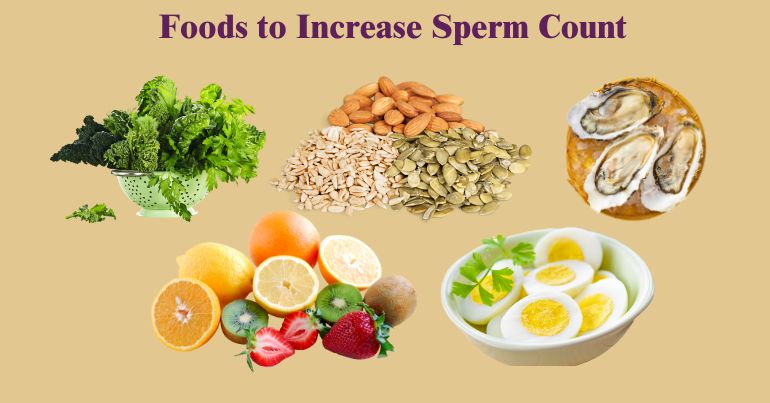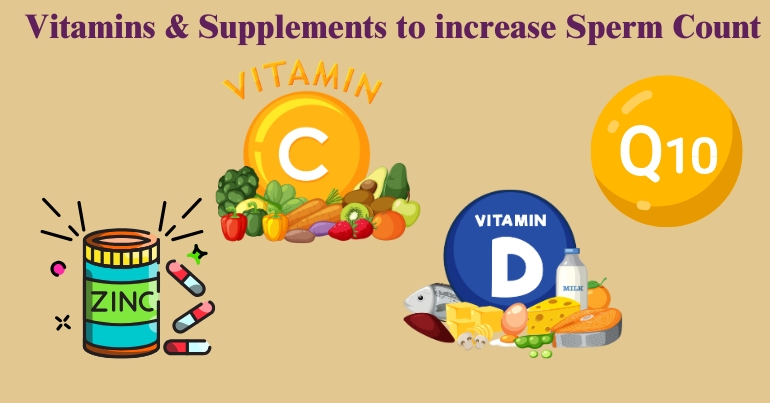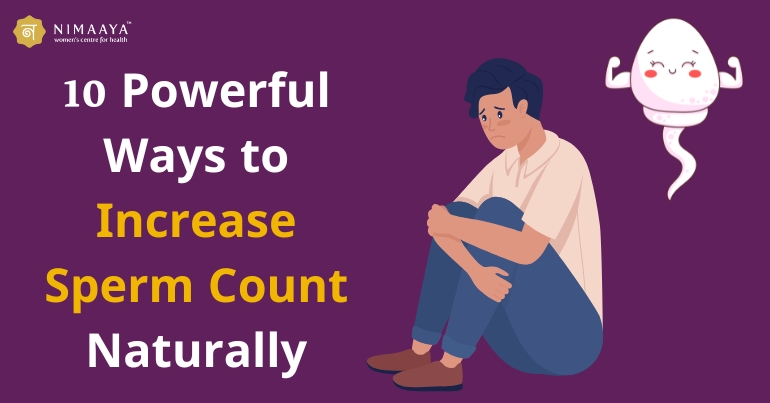Male fertility is a growing concern in today’s fast-paced, stress-laden world. A key indicator of male fertility is sperm count, and low sperm count (oligospermia) can affect a couple’s ability to conceive. Fortunately, there are several natural methods to increase sperm count and quality, ranging from dietary changes to stress management and lifestyle modifications. In this detailed guide, we will explore 10 powerful, natural ways to increase sperm count, along with tips on diet, supplements, exercise, sleep, and more.
1. Best Foods to Increase Sperm Count

What you eat directly influences your sperm health. Here are some fertility-friendly foods:
a. Leafy Greens
Spinach, kale, and other leafy greens are high in folate, which improves sperm quality and reduces DNA fragmentation.
b. Nuts and Seeds
Walnuts, flaxseeds, and sunflower seeds are rich in omega-3 fatty acids and zinc, essential for sperm motility and count.
c. Fruits High in Vitamin C
Oranges, strawberries, and kiwi are high in vitamin C, an antioxidant that reduces oxidative stress on sperm.
d. Oysters and Shellfish
Packed with zinc, these foods can boost testosterone levels and increase sperm count.
e. Eggs
Loaded with protein and vitamin E, eggs help improve sperm motility and protect sperm cells from damage.
2. Natural Ways to Improve Sperm Quality
Sperm quality involves motility, morphology, and DNA integrity. To naturally enhance sperm quality:
- Avoid plastic containers: Many plastics contain BPA, a chemical linked to decreased sperm quality.
- Stay cool: Avoid hot tubs and saunas, as heat can lower sperm production.
- Limit alcohol and tobacco: These substances significantly reduce sperm health and increase DNA fragmentation.
3. Vitamins and Supplements to increase Sperm Count

Certain vitamins and minerals play a crucial role in sperm production:
a. Zinc
Supports testosterone levels and sperm development.
b. Vitamin C
Protects sperm from oxidative damage.
c. Vitamin D
Improves testosterone levels and sperm motility.
d. Coenzyme Q10 (CoQ10)
An antioxidant shown to improve sperm concentration and motility.
e. L-Carnitine
Helps with sperm energy metabolism and motility.
f. Folate
Works with zinc to improve overall sperm health and reduce chromosomal defects.
Before starting any supplement, consult a healthcare professional for proper dosage and safety.
- Lifestyle Changes to Increase Sperm Count Production
Making the right lifestyle choices can significantly impact sperm health:
- Maintain a healthy weight: Obesity is linked to lower sperm count and poor sperm function.
- Limit caffeine intake: Excessive caffeine may affect sperm motility.
- Hydrate adequately: Dehydration can reduce semen volume.
- Reduce exposure to toxins: Pesticides, heavy metals, and industrial chemicals can damage sperm DNA.
5. Common Causes of Low Sperm Count
Understanding what causes low sperm count can help you take preventive action:
a. Varicocele
A condition where veins in the scrotum become enlarged, often reducing sperm production.
b. Hormonal Imbalances
Issues with the pituitary gland or thyroid can interfere with testosterone production.
c. Infections
Sexually transmitted infections (STIs), such as chlamydia or gonorrhea, can impair sperm function.
d. Medication Side Effects
Some antibiotics, antifungals, and blood pressure medications can negatively impact sperm count.
e. Smoking and Drug Use
Tobacco, marijuana, and anabolic steroids are all known to reduce fertility in men.
6. Exercises to Improve Male Fertility
Regular, moderate exercise can improve fertility, but overtraining can have the opposite effect.
Recommended exercises:
- Cardio: Brisk walking, jogging, or swimming boosts circulation and hormone balance.
- Strength training: Moderate weight lifting increases testosterone levels.
- Yoga: Enhances relaxation and reduces stress, which can improve hormonal function.
Avoid:
- Excessive cycling: Can cause heat and pressure in the groin area.
- Steroid use: Some bodybuilders use anabolic steroids, which suppress sperm production.
7. Effects of Stress on Sperm Count
Chronic stress impacts hormone levels and negatively affects sperm production. When the body is under constant stress, it increases the production of cortisol, a hormone that suppresses testosterone.
Tips to manage stress:
- Mindfulness and meditation: Improve focus and reduce anxiety.
- Deep breathing: Lowers heart rate and relaxes the body.
- Therapy or counseling: Offers emotional support and guidance.
- Hobbies: Playing music, painting, or spending time in nature can be therapeutic.
8. Best Home Remedies to Boost Sperm Health
Nature offers a range of home remedies that can enhance sperm health:
a. Ashwagandha (Indian ginseng)
Boosts testosterone levels and increases sperm count.
b. Shilajit
A natural resin used in Ayurveda to enhance male vitality and sperm motility.
c. Fenugreek seeds
Improve libido and sperm concentration.
d. Garlic
Contains allicin, which improves blood flow and sperm viability.
e. Maca root
Native to Peru, it enhances libido and increases sperm volume.
Use these in moderation and consult a healthcare provider before use.
9. How Sleep Affects Sperm Production
Sleep plays a vital role in regulating reproductive hormones.
Poor sleep effects:
- Disruption in testosterone production
- Increased cortisol levels
- Lowered sperm motility and volume
Sleep tips for better fertility:
- 7–9 hours of uninterrupted sleep
- Avoid blue light from screens before bed
- Establish a regular sleep schedule
- Use blackout curtains and avoid caffeine in the evening
10. How Long Does It Take to increase Sperm Count?
Sperm development, or spermatogenesis, takes around 64 to 74 days. So any lifestyle changes you make today may take 2 to 3 months to reflect in your sperm count and quality.
Improvement Timeline:
- 1–2 weeks: Antioxidant levels in semen start to improve.
- 4–6 weeks: Better motility and sperm concentration.
- 8–12 weeks: Noticeable changes in sperm count and morphology.
Consistency is key. Regular monitoring through semen analysis can help track progress.
Conclusion: When to Seek Help from Fertility Experts
If you’ve tried natural methods for 3–6 months without improvement, or if you have underlying conditions like varicocele, infections, or hormonal imbalances, it’s time to consult a fertility specialist.
For those seeking expert guidance and advanced fertility treatments, Nimaaya IVF Center is one of the most trusted names in reproductive healthcare. With state-of-the-art facilities, personalized care, and a compassionate team, Nimaaya offers holistic fertility solutions tailored to your needs. Whether you’re exploring IUI, IVF, or simply need diagnostic clarity, their comprehensive services ensure you’re in the best hands.
FAQ
Q: What is considered a low sperm count?
A sperm count of fewer than 15 million sperm per milliliter of semen is considered low (oligospermia) by the World Health Organization (WHO).
Q: How can I check my sperm count at home?
There are at-home sperm test kits available that measure sperm concentration and motility. However, for accurate results and full semen analysis (volume, morphology, motility, etc.), it’s best to visit a certified fertility clinic like Nimaaya IVF Center.
Q: Can wearing tight underwear affect sperm count?
Yes, tight underwear can increase scrotal temperature, potentially reducing sperm production. Boxer briefs or loose-fitting underwear are better for testicular health.
Q: Are supplements like zinc and CoQ10 safe to use?
Generally, these are safe when taken in recommended doses. However, it’s best to consult a fertility expert or doctor before starting any supplement regimen.
Q: Can smoking really lower sperm count?
Yes. Smoking tobacco or marijuana introduces toxins that impair sperm motility, reduce count, and damage DNA.

